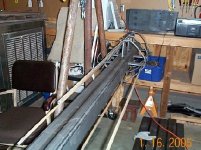Currmudgeon
Gold Member
</font><font color="blue" class="small">( Dirt guys are guessing 98 - 99% compaction. Will have it tested before the pour.)</font>
If you have to trench in your plumbing, I would try to get as much compaction on those trenches as I could with had tools or a vibrator plate. That's pretty much what they do in the trades. After the rebar is in, you're pretty much locked off the surface. If it is well compacted, it should be OK until you pour. I;d try yo pour as soon as reasonable.
</font><font color="blue" class="small">( RE freezing concrete. I live in Texas. Granted, it's the highest and coldest part of Texas (near Amarillo), but it's pretty rare for the ground to freeze much here.)</font>
Then the concrete in the post holes won't freeze either. The warmth of the dirt will protect it. Concrete is exothermal, so it gives off some heat when it sets. I'd insulate the top surfaces with a couple inches of straw, if it was going to get down near freezing.
If you have to trench in your plumbing, I would try to get as much compaction on those trenches as I could with had tools or a vibrator plate. That's pretty much what they do in the trades. After the rebar is in, you're pretty much locked off the surface. If it is well compacted, it should be OK until you pour. I;d try yo pour as soon as reasonable.
</font><font color="blue" class="small">( RE freezing concrete. I live in Texas. Granted, it's the highest and coldest part of Texas (near Amarillo), but it's pretty rare for the ground to freeze much here.)</font>
Then the concrete in the post holes won't freeze either. The warmth of the dirt will protect it. Concrete is exothermal, so it gives off some heat when it sets. I'd insulate the top surfaces with a couple inches of straw, if it was going to get down near freezing.
